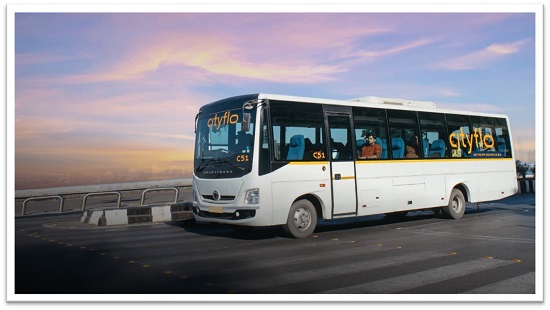
From Congestion to Connectivity – Mumbai Metro 3 Collaboration with Cityflo Aims to Save Time, Cut Costs and Drive a New Era of Sustainable Urban Travel
In a city where every minute counts, Mumbai’s Metro Line 3 has taken a decisive step toward transforming how the metropolis moves. Its recent partnership with Cityflo, a leading premium bus service, marks a shift from congestion to connectivity — from fragmented journeys to coordinated mobility.
This collaboration goes beyond transport integration. It represents a new way of thinking about urban infrastructure, one that blends affordability, technology, and sustainability. Together, Metro 3 and Cityflo are crafting a model for efficient, commuter-centric public mobility that could redefine urban transport in India’s financial capital.
Seamless Travel for the Modern Commuter
Under the broader “Seamless Mumbai” vision, this partnership brings together the speed of the metro and the reliability of app-based buses. Cityflo’s air-conditioned buses will now connect key Metro Line 3 stations — Bandra Kurla Complex (BKC), Worli, and Chhatrapati Shivaji Maharaj Terminus (CSMT) — to major business and residential hubs.
The service operates every 10 minutes during peak hours, ensuring frequent and convenient travel. The starting fare is ₹29 per trip, offering an affordable option for commuters. Bookings can be made easily through the Cityflo and MetroConnect3 apps, providing a seamless and user-friendly experience for passengers.
The service guarantees seats and timely departures, reducing one of Mumbai’s biggest commuter pain points — unpredictable last-mile connections. By synchronizing schedules and integrating payments digitally, the initiative creates a door-to-desk ecosystem for office-goers and daily travellers alike.
Solving the Last-Mile Puzzle
Last-mile connectivity remains one of the toughest challenges for India’s urban transport systems. A 2023 NITI Aayog study found that over 40 percent of metro users in major Indian cities cite weak last-mile options as the reason they do not rely fully on public transport.
The Metro 3–Cityflo initiative directly addresses this gap with data-driven design and digital coordination. It merges route analytics, commuter demand mapping, and flexible scheduling to ensure efficient movement between metro exits and final destinations. The outcome is not just convenience, but predictability and reliability, both essential for building commuter trust in public transport.
Affordability Meets Comfort
With fares starting at ₹29, the partnership combines affordability with comfort — a rare balance in metropolitan mobility. A typical journey between Worli and BKC can cost ₹200–₹300 via taxis or app-based cabs, making this integrated service five to six times cheaper.
This cost efficiency matters in Mumbai, where over eight million residents depend on public transport daily. By offering a premium yet affordable option, Metro 3 and Cityflo are encouraging a behavioural shift — nudging citizens toward shared, sustainable transport instead of private cars.
Affordable comfort also boosts inclusivity. It enables professionals, students, and service-sector employees to experience a reliable commute without financial strain, while ensuring the network remains economically viable for operators.
Sustainability in Motion
The collaboration also advances Mumbai’s environmental goals. The city’s metro system already prevents an estimated 22,000 tonnes of CO₂ emissions annually, and Cityflo’s energy-efficient fleet adds further impact.
According to the Centre for Science and Environment (CSE), if even 10 percent of Mumbai’s private car users switch to integrated public transport, the city could save nearly 150,000 tonnes of CO₂ every year. This partnership represents a tangible step toward that milestone by combining metro efficiency with cleaner, shared surface mobility.
Beyond emissions, the initiative also aims to ease congestion in high-traffic zones like BKC and Worli, cutting idle-time pollution and improving overall air quality. By creating a reliable alternative, Metro 3 and Cityflo are turning sustainability from a slogan into a daily commuting habit.
Towards a Truly Seamless Mumbai
The partnership is a crucial building block in Mumbai’s journey toward a multi-modal, digitally connected transport framework. It reflects a future where a commuter can plan, book, and complete a journey through a single digital platform — from metro to bus to shared mobility.
This alignment between public infrastructure and private innovation strengthens the foundation for “Seamless Mumbai,” an initiative aimed at eliminating friction between various transport modes. The collaboration also sets the stage for broader integration with BEST buses, e-mobility fleets, and app-based ticketing systems, building a transport ecosystem that is synchronized and commuter-first.
A Blueprint for Urban India
The Mumbai Metro 3–Cityflo collaboration is more than a convenience upgrade; it is a case study in urban design and policy synergy. It shows how public and private players can co-create solutions that are not only efficient but equitable and sustainable.
As India’s urban population is projected to touch 600 million by 2036, cities will need scalable models that combine government infrastructure with entrepreneurial agility. This initiative demonstrates how such a balance can be achieved — one ride, one route, and one data-driven decision at a time.
Mumbai’s latest move proves that the future of mobility lies not just in speed, but in seamless connectivity, sustainable planning, and shared progress.




